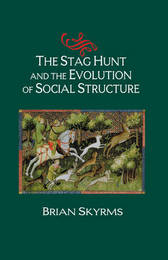
|
The Stag Hunt and the Evolution of Social Structure
Hardback
Main Details
| Title |
The Stag Hunt and the Evolution of Social Structure
|
| Authors and Contributors |
By (author) Brian Skyrms
|
| Physical Properties |
| Format:Hardback | | Pages:166 | | Dimensions(mm): Height 216,Width 140 |
|
| Category/Genre | Social and political philosophy |
|---|
| ISBN/Barcode |
9780521826518
|
| Classifications | Dewey:301 |
|---|
| Audience | | Professional & Vocational | | Tertiary Education (US: College) | |
|---|
|
Publishing Details |
| Publisher |
Cambridge University Press
|
| Imprint |
Cambridge University Press
|
| Publication Date |
15 December 2003 |
| Publication Country |
United Kingdom
|
Description
Brian Skyrms, author of the successful Evolution of the Social Contract (which won the prestigious Lakatos Award) has written a sequel. The new book is a study of ideas of cooperation and collective action. The point of departure is a prototypical story found in Rousseau's A Discourse on Inequality. Rousseau contrasts the pay-off of hunting hare where the risk of non-cooperation is small but the reward is equally small, against the pay-off of hunting the stag where maximum cooperation is required but where the reward is so much greater. Thus, rational agents are pulled in one direction by considerations of risk and in another by considerations of mutual benefit. Written with Skyrms's characteristic clarity and verve, this intriguing book will be eagerly sought out by students and professionals in philosophy, political science, economics, sociology and evolutionary biology.
Reviews'... dense but exciting ... comprehensive and ambitious in scope ... a treasure trove of interesting and intriguing results.' Times Literary Supplement 'The book is a treasure trove of interesting and intriguing results...'. Times Literary Supplement 'I can unreservedly recommend this delightful book. It is an absolute pleasure to read and a more stimulating introductory text on evolutionary thinking of social institutions is hard to image ... Brain Skyrms has done us a great service, and I am looking forward to his next book.' Studia Logica
|